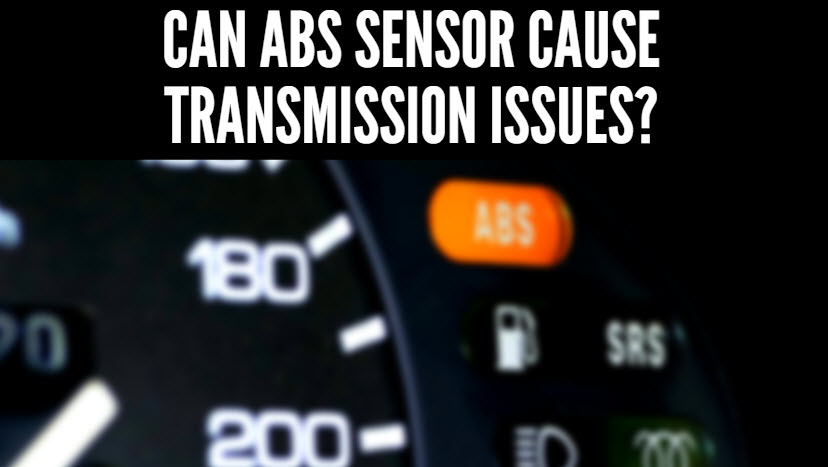Can ABS Sensor Cause Transmission Issues?
The ABS system is a safety feature that helps prevent the wheels from locking up when you are braking. It does this by pulsing the brake to release pressure and slow down your vehicle. The sensor in the ABS system monitors wheel speed, pedal effort, and braking force to determine if any changes need to be made. This article will discuss how an ABS sensor can cause issues with transmission performance on some vehicles.
ABS Sensors: What Are They?
ABS sensors are usually mounted on the brake assembly. They have a simple job – to measure how much force is being applied by the brakes during an emergency stop, and then relay that information back to your car’s ABS system. In most vehicles, there’s one sensor per wheel. Keep in mind that the ABS system was designed for anti-skid applications, so it doesn’t respond to a vehicle’s traction.
When ABS sensors go bad they tend to affect the braking system as a whole rather than just one wheel or another. This is because all of those signals from individual wheels have to be processed by the car’s computer and then relayed back out again through an electronic control unit or a hydraulic control unit.
If the ABS sensor isn’t sending good signals back to either of these components, your brake pedal will feel mushy and it might take longer than usual for you to stop when braking hard in an emergency situation.
ABS sensors go bad most often due to overheating under extreme conditions such as racing or track day use. Some ABS sensors are more robust than others, but if they get too hot the electronics inside of them can fail. The reason for this failure is usually a missing heat sink or some sort of thermal insulation issue that’s preventing the sensor from cooling down properly.
If you’ve got an aftermarket performance exhaust system installed on your car, there could be some additional heat being generated that’s causing your ABS sensor to overheat. This isn’t always the case, but if you’ve got an aftermarket exhaust system chances are it was designed for racing rather than street use, so there might be a problem with insulation or ventilation that could potentially cause problems down the road.
Can ABS Sensor Cause Transmission Issues?
Yes! The ABS sensor can cause transmission issues because it will not send the correct information to your car’s computer. This causes the engine control unit (ECU) to lose communication with various components of the drive train which will affect how well you are able to start moving after coming to a stop. If this happens, then you might notice that there is a delay when you give the car gas.
The good news is that there are ABS sensors available to replace your old or faulty one, and this will keep your transmission from having any long-term issues. In fact, replacing an ABS sensor for cars might also fix other problems such as low fuel economy which can be caused by idle speed control issues.
It is important to keep in mind that your ABS sensor could be the cause of any car troubles you are having, not just transmission issues. If it has been a few years since you have had an issue with the drive train then replacing the old ABS sensors will most likely solve any future problems as well. As long as there are no other issues with your car, such as an engine computer malfunction or a faulty wheel speed sensor causing transmission slippage.
No matter what issue you are having under the hood of your vehicle it is always best to have a professional take a look at the problem and then perform any repairs that might need to be done. You can visit a local mechanic to have them diagnose the problem for you, or take it into a car repair shop.
Also Read: Do Race Cars Have ABS?
Why does the ABS light appear on the dashboard?
ABS sensors are present in cars with this feature, which means that when the driver hits the brake pedal hard during emergency braking, the system activates to reduce stopping distance and prevent lockup of wheels. When ABS detects a problem in any part of its circuitry or pressure sensor it turns on the ABS light. This is usually because of a wiring issue or broken sensor that needs to be replaced in order for the vehicle to function properly again.
If you notice your car’s brake pedal feels spongy, it could also mean fluid has leaked from one of two main parts: either the master cylinder or rear cylinders where power brakes are most common. If you notice a few drops on the ground, check to see if there is any discoloration in that area and also pay attention to your brake fluid level as it may be low or empty.
There are many different things that can cause ABS sensors to go wrong and turn on the lights: faulty wiring, broken sensors, worn out rotors and calipers. It is very important to get these looked at right away if they are causing issues with your braking system or ABS light will stay on continuously until it is fixed by a professional.
If you are checking the ABS light on your dashboard, make sure it is not for another problem with a tire or wheel speed sensor.
One of the most common reasons that will cause an ABS warning light to turn on in your car’s dashboard is because one or more sensors have failed. The only way to find out if this has happened is to have a professional look at your braking system.
Where are ABS Sensors found in a Car?
ABS stands for anti-lock brake system. It is an electronic braking technology that allows the driver to maintain steering control during emergency stops by automatically modulating the pressure of each wheel’s brakes, preventing them from locking up under hard braking conditions. This helps drivers avoid skidding and other problems while stopping in various road conditions.
The ABS sensors are usually found in the hydraulic brake lines of your car. However, you can also find them near or on top of each wheel assembly. You need to check with your mechanic or service station for more information on finding them since every make and model is different. Generally, they look like small cylinders.
How can you fix faulty ABS sensors?
There is no specific cause and effect relationship with ABS sensors and transmission issues. It’s important to understand how the system works in order to properly diagnose any problems you may be experiencing.
ABS systems are designed as a safety backup for drivers when they need them most, such as during slippery conditions or braking at high speeds.
Due to the fact that ABS sensors work with your brake system, this can cause issues if there is an underlying problem already present in either of these systems. If you have ABS issues, it’s best to consult with a professional so they can properly diagnose the problem and determine whether or not replacing your ABS sensors will help fix this issue.
Bottom Line
The ABS sensor is very easy to replace, so there are no real disadvantages other than the cost of replacement. And while its possible that an ABS system malfunction could cause problems with your transmission, it’s not likely. The most common source for a problem like this would be either loose wires or poor electrical connections in the wiring harness near the sensors.
If you suspect that your ABS system has malfunctioned, take a look at the wires to see if they have been chewed on by rodents or snagged by something sharp. If there are signs of damage, repair as needed and replace any damaged wiring before replacing the sensors themselves.
The most likely source for transmission problems caused by ABS would be poor connections in the wiring harness. Look for any signs of damage to the wires and make sure they are properly routed away from moving components like your driveshafts, axles, etc.







